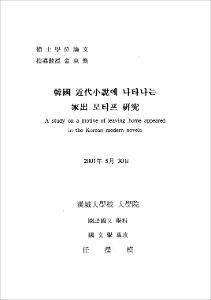韓國 近代小說에 나타나는 家出 모티브 硏究
- Files in This Item:
-
-
Download
 000000066002.pdf
기타 데이터 / 3.19 MB / Adobe PDF
000000066002.pdf
기타 데이터 / 3.19 MB / Adobe PDF
-
Items in Repository are protected by copyright, with all rights reserved, unless otherwise indicated.
 000000066002.pdf
기타 데이터 / 3.19 MB / Adobe PDF
000000066002.pdf
기타 데이터 / 3.19 MB / Adobe PDFItems in Repository are protected by copyright, with all rights reserved, unless otherwise indicated.